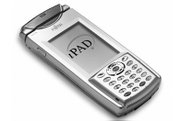Road Show
Retailers look to mobile technology for better customer service
It shouldn’t be long before wireless technology invades retail selling floors in a big way, making it possible for consumers to buy products from anyplace in a store with a little help from a hand-held computer.
A new protocol standard in wireless data transmissions has opened the door for such computers to become more viable in retail, as the speed of transmission has been greatly improved with the recent ratification of the 802.11b protocol by the Institute of Electrical and Electronic Engineering (IEEE). This ratification makes it possible to now send data at a rate of 11 megabytes per second. Previously, the quickest rate was about 2 megabytes per second.
New interest in the use of wireless communications in retail, sparked by the new standard, was prevalent during last week’s National Retail Federation (NRF) Conference in New York. Getting lots of attention in New York was Fujitsu Transaction Solutions Inc.’s new Ipad hand-held computer, which is set for deliveries around mid-year at a price of about $2,000. The small, 10-ounce unit links to a retailer’s local area network and does everything from reading ATM cards and credit cards to scanning bar codes, managing inventories, paging employees and conducting gift registries.
“The idea is to make for a better shopping experience for customers and improve productivity at the management level,” said Vernon Slack, director of marketing for Fujitsu’s Mobile Solutions Group based in Dallas. “In the past, hand-held units would help in the automation of the supply chain. This will do that but is better positioned to perform at the POS [point-of-sale] level.”
Slack said the Ipad goes further than other PDAs (personal digital assistants) because of its ability to scan such items as magnetic cards and Smart cards. Ipad also features an encrypted keypad function and has a color screen that is viewable indoors and outdoors. The unit operates with Microsoft’s Windows CE.Net platform.
Slack illustrated other Ipad-enhanced scenarios, including informing management about irregularities at the cashier level, such as one too many voids or no-sales. Fujitsu is also testing the Ipad’s artificial intelligence capabilities with a major shoe retailer. With these capabilities, the Ipad can prompt a sales associate to bring out specific styles in addition to the requested one as a way to improve add-on sales. Customer profiles can also be accessed to improve service, according to Slack.
Fujitsu scored its biggest endorsement for its POS line by signing a three-year deal with Nordstrom to become the retailer’s national point-of-sale provider throughout its 132-unit chain.
Even with retail strapped with slower sales, Slack sees the investment in wireless technology coming on strong. Citing industry projections, he said wireless products are slated to grow at a 20 percent annual clip over the next few years. In certain scenarios, wireless technology is estimated to save 20 percent off of operating costs.
In an ideal situation, Slack sees every sales associate in a store armed with Ipad devices. He said the store of the future will allow consumers to buy products from any part of the store and minimize wait.
“I see retail floors of the future having fewer [cashier] stations,” said Slack. “We had lots of good reaction at NRF. Lots of retailers had good Christmases and they’re starting to recognize how they save money by increasing efficiencies by refreshing their [technology] products.”
It appears the wireless age is just getting started. Hand-held computers are eliciting interest regarding their use with supply-chain and CRM applications for back-office operations.
Aria Systems, a New York-based software company that markets a 14-module solution for the apparel industry, recently updated its products to support hand-held technology. This allows warehouse workers to communicate in real time with Aria’s system.
SAMSys Technologies Inc., a Canadian supplier of radio frequency identification readers, is trying to eliminate the compatibility problem in retail with a universal reader, which can read tags from multiple vendors.
Aside from investment cost, compatibility issues are likely holding back some retailers from investing in mobile technology. The 802.11b protocol has been widely accepted but not all vendors are interoperable. The emerging personal area network technologies enable devices not linked to a specific network.






















